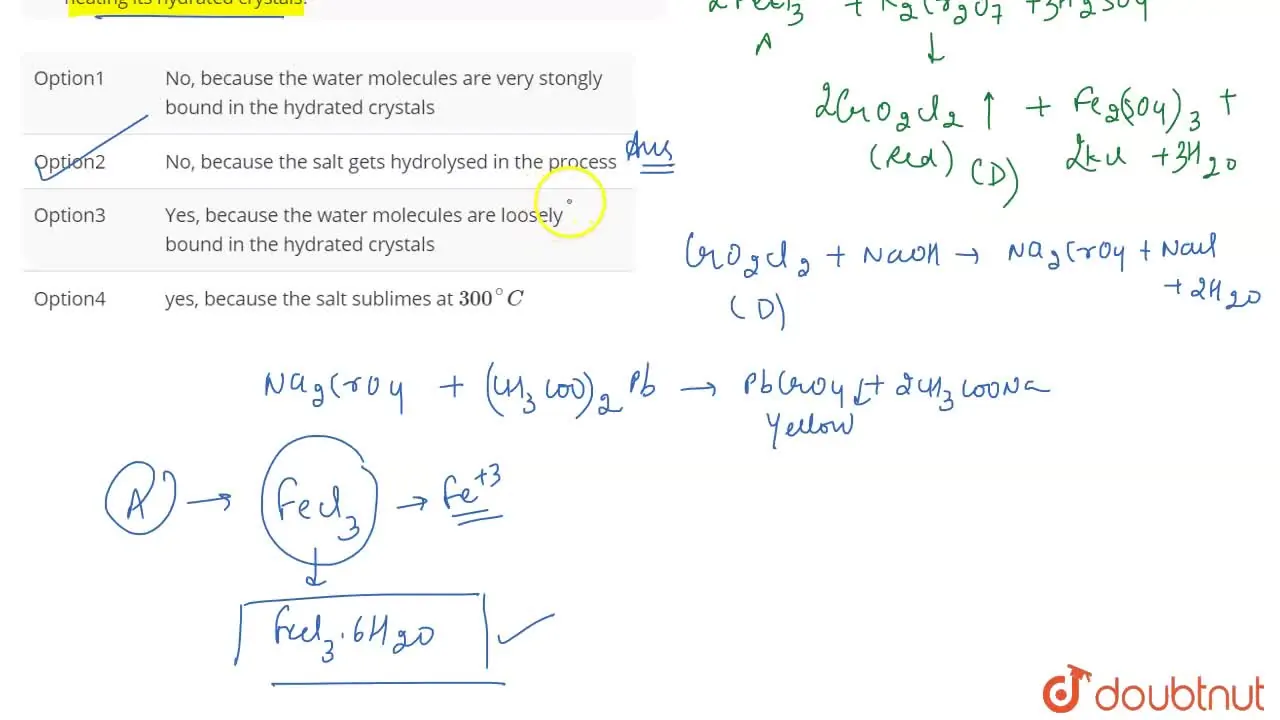(i) An aqueous solution of a compound A is acidic towards litmus and A sublimes at about 300∘C
(ii) A solution of A, on treatment with an excess of NH4SCN, gives a red compound, and on treatment with a solution of K4[Fe(CN)6], gives a blue compound.
(iii) The solid A, on being heated with an excess of K2Cr2O7 in the presence of concentrated H2SO4, evolves deep red vapours of D.
(iv) On passing the vapours of D into a solution of NaOH and then adding the solution of acetic acid and lead acetate, a yellow precipitate of a compound E is obtained.
Q. Can compound A be prepared in the anhydrous form by strongly heating its hydrated crystals?
No, because the water molecules are very stongly bound in the hydrated crystals
No, because the salt gets hydrolysed in the process
Yes, because the water molecules are loosely bound in the hydrated crystals
yes, because the salt sublimes at 300∘C
The correct Answer is:B
Step by step video & image solution for (i) An aqueous solution of a compound A is acidic towards litmus and A sublimes at about 300^(@)C (ii) A solution of A, on treatment with an excess of NH_(4)SCN, gives a red compound, and on treatment with a solution of K_(4)[Fe(CN)_(6)], gives a blue compound. (iii) The solid A, on being heated with an excess of K_(2)Cr_(2)O_(7) in the presence of concentrated H_(2)SO_(4), evolves deep red vapours of D. (iv) On passing the vapours of D into a solution of NaOH and then adding the solution of acetic acid and lead acetate, a yellow precipitate of a compound E is obtained. Q. Can compound A be prepared in the anhydrous form by strongly heating its hydrated crystals? by Chemistry experts to help you in doubts & scoring excellent marks in Class 12 exams.
Related Playlists
- BOOK - VK JAISWAL ENGLISHCHAPTER - QUALITATIVE INORGANIC ANALYSISEXERCISE - ONE OR MORE ANSWER IS/ARE CORRECT43videos
QUALITATIVE INORGANIC ANALYSIS
- BOOK - VK JAISWAL ENGLISHCHAPTER - QUALITATIVE INORGANIC ANALYSISEXERCISE - MATCH THE COLUMN4videos
QUALITATIVE INORGANIC ANALYSIS
- BOOK - VK JAISWAL ENGLISHCHAPTER - QUALITATIVE INORGANIC ANALYSISEXERCISE - LEVEL 276videos
QUALITATIVE INORGANIC ANALYSIS
- BOOK - VK JAISWAL ENGLISHCHAPTER - PERIODIC PROPERTIESEXERCISE - MATCH THE COLUMN11videos
PERIODIC PROPERTIES
- BOOK - VK JAISWAL ENGLISHCHAPTER - s-BLOCK ELEMENTSEXERCISE - SUBJECTIVE PROBLEMS2videos
s-BLOCK ELEMENTS
Similar Questions
(i) An aqueous solution of a compound (A) is acidic towards litmus and (A) sublimes at about 300∘C.
(ii) (A) on treatment with an excess of NH4SCN gives a red coloured compound (B) and on treatment with a solution of K4[Fe(CN)6] gives a blue coloured compound (C).
(iii) (A) on heating with excess of K2Cr2O7 in the presence of concentrated H2SO4 evolves deep red vapours of (D).
(iv) On passing the vapour of (D) into a solution of NaOH and then adding the solution of acetic acid and lead acetate, a yellow precipitate of compound (E) is obtained.
Identify (A) to (E) and give chemical equations for the reactions.View Solution(i) An aqueous solution of a compound (A) is acidic towards litmus and (A) sublimes at about 300∘C.
(ii) (A) on treatment with an excess of NH4SCN gives a red coloured compound (B) and on treatment with a solution of K4[Fe(CN)6] gives a blue coloured compound (C).
(iii) (A) on heating with excess of K2Cr2O7 in the presence of concentrated H2SO4 evolves deep red vapours of (D).
(iv) On passing the vapour of (D) into a solution of NaOH and then adding the solution of acetic acid and lead acetate, a yellow precipitate of compound (E) is obtained.
Identify (A) to (E) and give chemical equations for the reactions.View SolutionIdentify A to C.
(a). An aqueous solution of a compoud (A) is acidic towards litmus and (A) is sublimed at about 300∘C.
(b). (A) on treatment with an excess of NH4CNC gives a red coloured compound (B) and on treatment with a solution of K4Fe(CN)6 gives a blue coloured compound (C).View SolutionFeCl3 is acidic towards litmus. On treatment with excess of NH4SCN it gives red coloured compound (A) and on treatment with excess of K2Cr2O7 in the presence of conc. H2SO4, it evolves deep red vapours of (B) on passing the vapours of (B) into NaOH, then adding a solution of acetic acid and lead acetate it gives yellow ppt. of compound of chromium (C)
The compound B isView SolutionFeCl3 is acidic towards litmus. On treatment with excess of NH4SCN it gives red coloured compound (A) and on treatment with excess of K2Cr2O7 in the presence of conc. H2SO4, it evolves deep red vapours of (B) on passing the vapours of (B) into NaOH, then adding a solution of acetic acid and lead acetate it gives yellow ppt. of compound of chromium (C)
The compound A isView SolutionFeCl3 is acidic towards litmus. On treatment with excess of NH4SCN it gives red coloured compound (A) and on treatment with excess of K2Cr2O7 in the presence of conc. H2SO4, it evolves deep red vapours of (B) on passing the vapours of (B) into NaOH, then adding a solution of acetic acid and lead acetate it gives yellow ppt. of compound of chromium (C)
What is the hybridisation of chromium in compound (C) ?View SolutionSodium chloride on heating with aqueous solution of K2Cr2O7 and concentrated H2SO4 produces:
View SolutionSolid KCl, when heated with solid K2Cr2O7 and concentrated H2SO4, gives red vapours (a) that turn NaOH solution yellow (b). The yellow solution, when acidified with acetic acid and treated with lead acetate, gives a yellow precipitate (c). which of the following is true with respect to a, b and c?
View SolutionWhen a mixture of solid NaCl and solid K2Cr2O7 is heated with concentrated H2SO4 deep red vapours are obtained.This is due to the formation of:
View SolutionAcetyl bromide reacts with excess of CH3MgI followed by
treatment with a saturated solution of NH4Cl gives:View Solution


